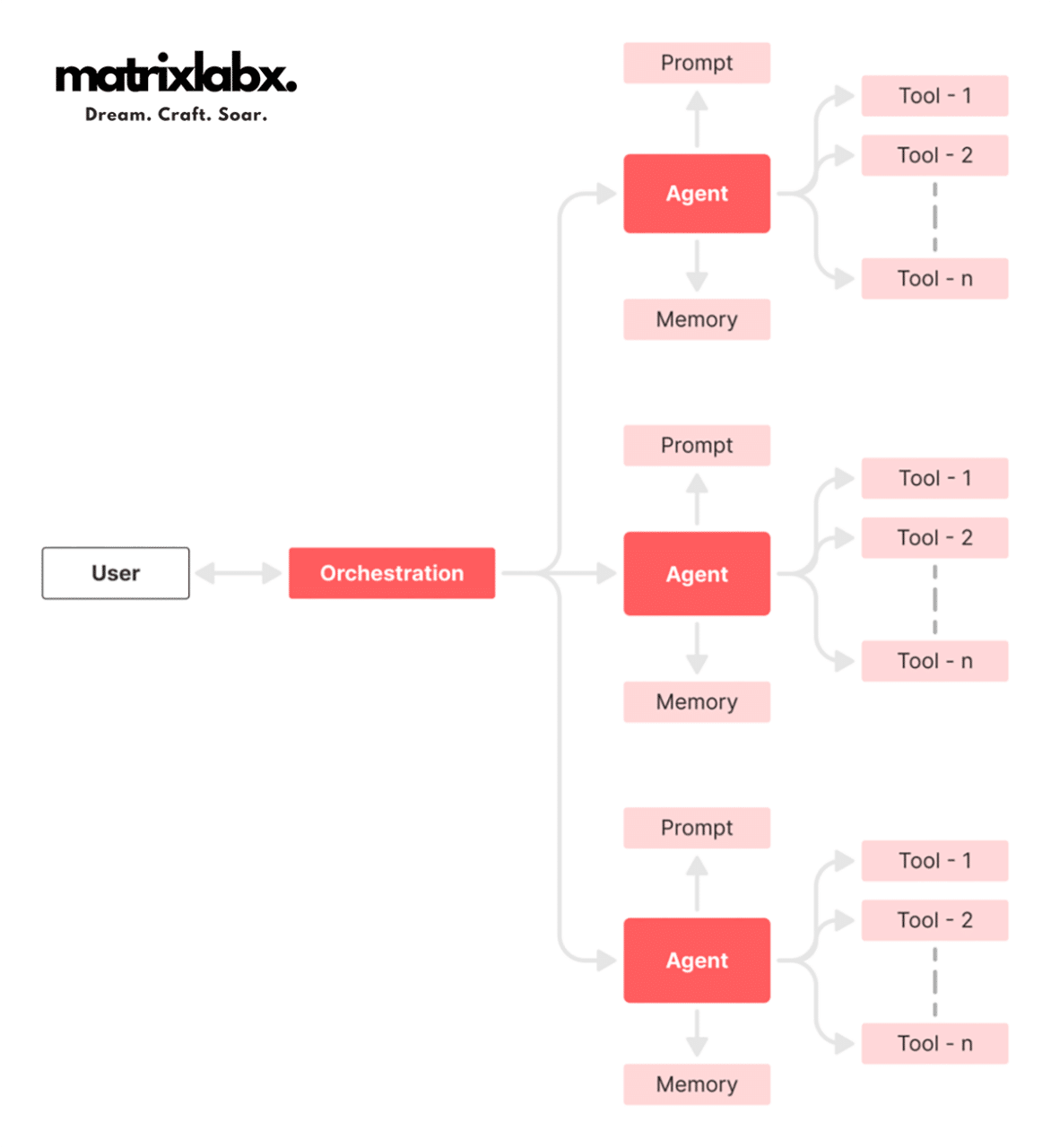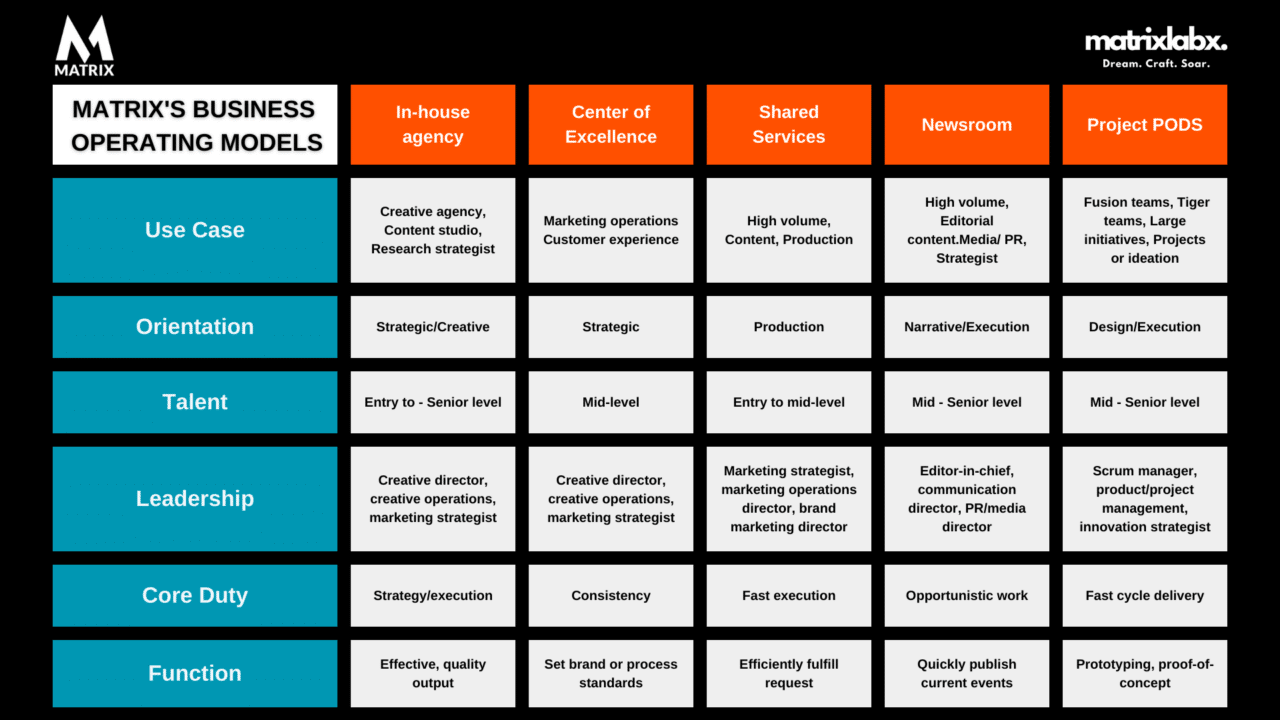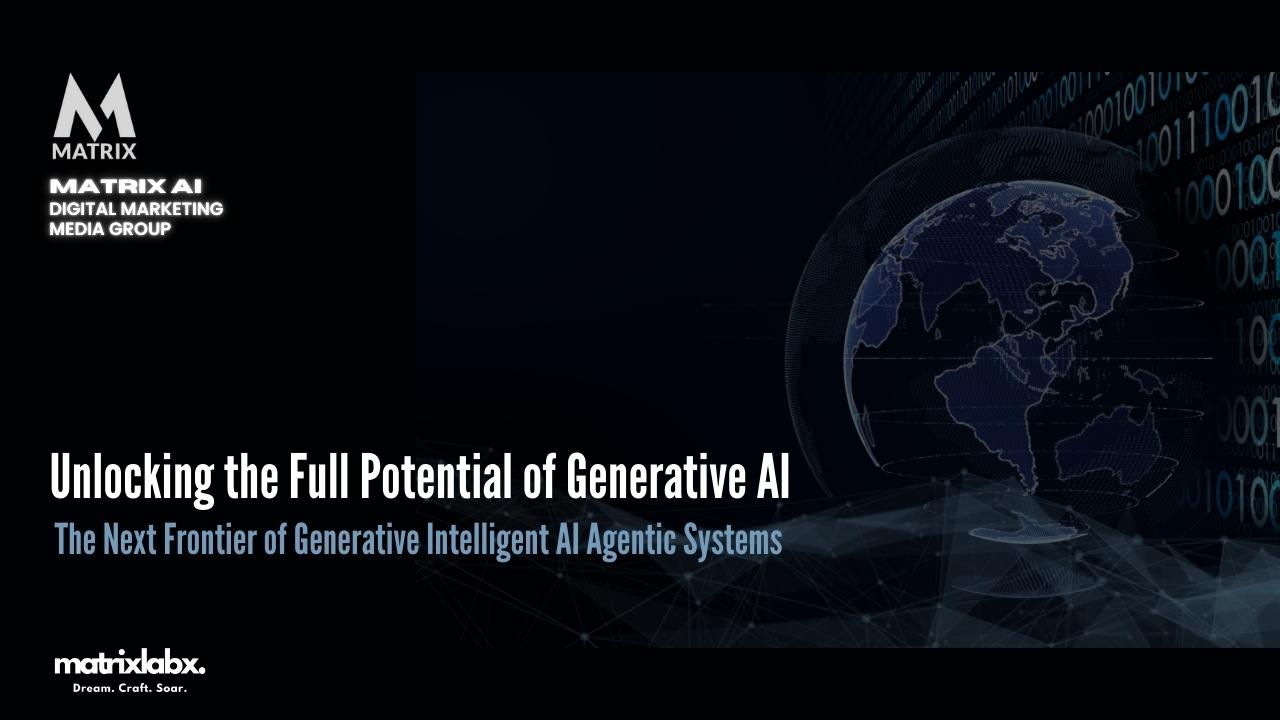Unlocking the Full Potential of Generative AI: The Power of Domain-Level Transformation
Learn how to unlock the full value of Generative AI: The power of domain-level transformation.
MatrixLabX Unveils Symphony AI Suite: A Revolutionary Leap in Marketing Automation
MatrixLabX, a trailblazer in AI-driven marketing innovation, proudly introduces Symphony AI, a groundbreaking suite of 42 specialized AI agents designed to empower modern marketers with unmatched precision and efficiency. Tailored for small and mid-sized businesses, Symphony redefines marketing automation by delivering actionable insights, streamlining workflows, and driving impactful results.
Symphony’s core is its Compound AI Agent Architecture, a sophisticated system seamlessly integrating multiple specialized AI agents into a unified, cohesive operation. This revolutionary approach enables these agents to collaborate effectively, tackling complex marketing challenges with unparalleled agility and intelligence.
In Symphony, AI operates like a conductor, orchestrating each specialized agent—each akin to a virtuoso musician—into harmonious collaboration. This autonomous and interconnected agent ecosystem ensures a seamless, end-to-end marketing performance, much like a symphony delivering a powerful and cohesive musical experience. Content Translation Services: A Competitive Advantage for Your Business
What is AGI – Artificial General Intelligence Explained – Matrix Marketing Group Symphony AI
The Symphony Advantage: AI-Powered Harmony
- Purpose-Built AI Agents: Each of Symphony’s 42 agents is expertly designed to handle a specific marketing function, ensuring precision and expertise across diverse tasks.
- Orchestration Layer: A dynamic control system coordinates agent interactions, easily enabling complex, multi-step marketing processes.
- Data-Driven Excellence: Symphony ensures consistency and accuracy with advanced data integration and preprocessing mechanisms, providing a solid foundation for all operations.
- Continuous Learning: Feedback loops allow the system to learn from outcomes, adapt strategies, and refine workflows over time for continuous improvement.
With Symphony AI, MatrixLabX empowers marketers to transcend the boundaries of traditional automation, offering a powerful blend of autonomy, collaboration, and intelligence that adapts to their evolving needs.
Unleash the power of AI-driven harmony with Symphony AI Suite and experience marketing automation as it’s meant: intuitive, impactful, and effortlessly efficient. The future of marketing is here.
This refined version sharpens the messaging, adds emotional resonance, and frames Symphony AI’s features as benefits, engaging your target audience more effectively.
In the bustling world of marketing, Jennifer, a dedicated Chief Marketing Officer, faced a daunting challenge. The rise of Generative AI brought about a new marketing era, requiring skills beyond traditional marketing expertise.
Natural language processing, prompt engineering, and data manipulation were now essential tools for success. Like many of her peers, Jennifer struggled with AI literacy, feeling overwhelmed by the complex technicalities of Generative AI.
Jennifer’s frustration grew as she saw her competitors harness the power of AI to deliver innovative campaigns, automate processes, and gain valuable insights into customer behavior. She knew she needed to adapt to stay competitive but felt lost in unfamiliar concepts and jargon.
One evening, during a networking event, Jennifer met Maya, a brilliant AI expert from MatrixLabX. Maya introduced Jennifer to the concept of AI Agentic Systems for marketing, a revolutionary approach that simplified Generative AI for non-technical professionals.
Maya explained how AI Agentic Systems acted as intelligent assistants, guiding users through building and deploying AI models without the need for coding or extensive AI knowledge.
Intrigued, Jennifer eagerly embraced Maya’s guidance. She began experimenting with the AI Agentic Systems platform, starting with simple tasks like generating marketing content and analyzing customer data.
To her delight, she found the process incredibly intuitive and user-friendly. The system provided step-by-step instructions, real-time feedback, and access to a library of pre-trained models relevant to marketing.
As Jennifer’s confidence grew, she started tackling more complex tasks, such as personalizing customer experiences and optimizing marketing campaigns.
The AI Agentic Systems platform acted as her trusted co-pilot, offering suggestions, identifying potential pitfalls, and helping her refine her strategies. Jennifer realized that she no longer needed to be an AI expert to leverage the power of Generative AI.
With the help of AI Agentic Systems, Jennifer transformed her marketing department. Her team became more agile and efficient, generating high-quality content, analyzing data in real time, and delivering personalized customer experiences.
Jennifer’s campaigns became more targeted and engaging, increasing customer engagement, improving brand loyalty, and increasing sales.
Jennifer’s journey from AI illiteracy to AI-powered marketing success inspired her colleagues and peers. She shared her experience at industry conferences, advocating for the adoption of AI Agentic Systems and empowering fellow marketers to embrace the future of marketing.
As Generative AI continues to evolve, Jennifer remains at the forefront of innovation, confident in her ability to adapt and thrive in the ever-changing marketing landscape. And it all started with a chance encounter with Maya and the transformative power of AI Agentic Systems.
Empowering Intelligent Marketing with Multi-Agent RAG Systems
A New Era of AI with Matrix Marketing Group and MatrixLabX
Matrix Marketing Group, in partnership with MatrixLabX, is redefining the future of marketing through next-generation AI capabilities powered by Multi-Agent RAG Systems. This revolutionary approach elevates traditional AI, providing brands with an adaptable, deeply intelligent system for solving marketing challenges and seizing opportunities. Learn more.
Challenging to unlock the full potential of generative AI due to a few key obstacles:
1. Lack of Specialized Skills
- AI Literacy: Generative AI requires understanding machine learning principles, prompt engineering, and data manipulation—all skills that aren’t traditionally part of a marketing manager’s expertise.
- Talent Shortage: Skilled professionals with AI-specific knowledge are in high demand, making finding the right talent within teams difficult.
2. Quality Control Concerns
- Output Variability: Generative AI models sometimes produce inconsistent or inaccurate content, making quality control a significant hurdle.
- Brand Voice Consistency: Ensuring AI-generated content aligns with the brand’s tone and voice is difficult, especially across diverse platforms.
3. Data Limitations and Privacy Concerns
- Data Dependence: Generative AI relies heavily on high-quality data. Marketing managers may need more or more well-organized data, limiting the effectiveness of AI-generated content.
- Compliance and Privacy: Managing user data while complying with privacy laws like GDPR is complex. AI systems trained on customer data can raise legal and ethical concerns, restricting deployment.
4. Operational Integration Issues
- Workflow Disruption: Integrating AI into existing processes requires significant change management. It often involves rethinking workflows, retraining teams, and reconfiguring technology stacks.
- Collaboration Gaps: Marketing, IT, and data science teams must collaborate closely to implement AI effectively, but siloed structures often need to be improved.
5. Unclear ROI and Expectations
- ROI Measurement: AI’s benefits aren’t always immediately tangible, and many marketing managers struggle to define success metrics that justify AI investments.
- Overhyped Expectations: Generative AI is often marketed as a quick solution, so managers may be disappointed when the tool’s outputs don’t live up to the hype, creating skepticism about further investment.
6. Ethical and Trust Issues
- Bias in AI Models: Generative AI can inadvertently reinforce biases, which can be a liability for brand reputation and inclusivity efforts.
- Consumer Trust: Audiences are becoming more aware and sometimes wary of AI-generated content, and managing the transparency of AI use can be tricky.
7. Rapid Evolution and Keeping Up with Innovation
- Constant Updates: The rapid pace of AI advancements means tools are constantly evolving. Marketing managers may need help to keep up with new capabilities, techniques, and best practices.
- Adaptation to New Use Cases: AI applications for marketing are still emerging. Marketing managers must stay informed about novel AI functionalities, like content personalization and predictive analytics, which require continual learning and adaptation.
Effectively leveraging generative AI requires overcoming these challenges through cross-functional collaboration, investment in skills training, establishing clear metrics, and creating frameworks for ethical, quality, and privacy controls. AI Agentic Systems for Marketing Healthcare Organizations
Introduction to Unlocking the Full Potential of Generative AI with Domain-Level Transformation

Generative AI (Gen AI) has rapidly become a centerpiece in today’s technological landscape, offering organizations tools to drive faster innovation, enhance productivity, and improve employee and customer experiences.
However, Gen AI’s true potential can only be unlocked when companies embrace it as a transformative technology that redefines core business elements, from operating models to processes, capabilities, and culture.
Gen AI is not merely an addition to existing workflows; it’s a gateway technology capable of reshaping the broader digital transformation journey.
Companies must move beyond sporadic implementations to realize this transformative potential and prioritize focused, domain-level transformation.
By targeting specific domains—such as product development, marketing, and customer service—organizations can harness Gen AI’s ability to orchestrate end-to-end technology-led transformations, delivering more value than isolated applications ever could.
In this article, we’ll explore how adopting a domain-based approach allows companies to maximize the benefits of Gen AI and set the stage for further technological evolution. AIProdPad Product Development Transformation Through AI-Driven Innovation [White Paper]
Moving Beyond Experimentation: The Need for Transformative Change
Generative AI has captured widespread attention for its ability to automate processes, streamline operations, and generate new business ideas.
However, while individual employees may enthusiastically use Gen AI tools, true organizational impact requires a shift from fragmented experimentation to systematic integration. This transformation necessitates changes that are not merely technological but strategic and structural.
Organizations that view Gen AI as a “plug-and-play” tool lack its greater potential. Gen AI can fundamentally reshape businesses’ operations, pushing them toward data-driven, agile, and efficient models that continuously adapt to market demands.
This transformative approach requires a holistic operating model redesign, including key processes, talent strategies, and organizational culture.
With such a commitment, companies can easily utilize Gen AI and achieve the competitive edge that it promises. In today’s fast-paced business environment, Gen AI can be a decisive factor for companies striving to achieve sustained success.
The Power of Domain-Level Transformation
One of the most effective ways to harness Gen AI’s potential is to prioritize domain-level transformation. Rather than focusing on isolated applications, this approach integrates Gen AI across domains, encompassing all relevant functions, processes, and workflows. Domains such as product development, marketing, and customer service are prime candidates for this type of transformation because they often span multiple organizational boundaries and interact with various parts of the business.
Why Domains Matter
When Gen AI is applied at the domain level, it moves beyond isolated use cases, creating a unified experience that aligns with broader organizational goals. Here’s how it benefits each of these key domains:
- Product Development: Gen AI can accelerate the product development lifecycle by automating data analysis, forecasting trends, and enabling rapid prototyping. Companies can optimize the journey from ideation to market launch by applying Gen AI across the entire product domain, roving speed, and accuracy.
- Marketing: Gen AI enhances marketing by enabling deeper customer insights, personalizing content, and optimizing real-time campaigns. With a domain-focused approach, companies can apply AI across the marketing spectrum—from segmentation and targeting to content generation and customer engagement—creating an integrated, highly responsive marketing function.
- Customer Service: In customer service, Gen AI can streamline processes through chatbots, predictive analytics, and sentiment analysis. A domain-level approach ensures these tools work cohesively, improving customer journeys and enabling proactive, personalized support.
Key Benefits of Domain-Based Gen AI Implementation
By implementing Gen AI at the domain level, companies can unlock several critical benefits that surpass the potential of one-off applications:
1. Comprehensive Value Creation
When Gen AI is deployed across an entire domain, it can drive holistic value creation that spans every step of a workflow or process.
For example, in marketing, Gen AI can optimize the entire customer engagement journey, from initial awareness to post-purchase follow-up.
This end-to-end approach increases the overall impact and allows businesses to extract more value from their AI investment.
2. Enhanced Efficiency and Productivity
Domain-level implementation of Gen AI enables companies to streamline complex workflows, reduce manual labor, and decrease operational costs.
For example, in customer service, Gen AI can automate routine inquiries and help agents handle more complex issues, significantly improving response times and efficiency.
This increases productivity and frees up human resources for higher-value activities. Digital Marketing for Solar Companies to Increase Sales
3. Improved Customer and Employee Experiences
By optimizing domains that directly impact customer interactions, Gen AI can enhance the customer experience, making it more personalized and efficient. Similarly, employees benefit from streamlined workflows and reduced administrative burdens, allowing them to focus on strategic tasks and creating a more fulfilling work environment.
4. Faster Innovation and Agility
Gen AI enables companies to accelerate their innovation cycles in domains like product development.
By automating data collection and analysis, Gen AI provides insights that drive faster decision-making and allow quicker adaptation to market changes.
This agility is crucial for maintaining competitiveness in fast-evolving markets.
5. Scalability Across Organizational Boundaries
Once Gen AI is successfully implemented within a domain, its principles and infrastructure can often be scaled to other parts of the organization.
For instance, a predictive analytics model created for product development may later be adapted to support customer insights in marketing, creating an ecosystem of interconnected AI applications that reinforce one another.
Building the Foundation for Domain-Level Gen AI Transformation

Companies must establish a strong foundation to successfully implement Gen AI at the domain level, including clear objectives, cross-functional collaboration, and technological infrastructure. Here are the essential building blocks:
1. Defining a Clear Vision and Strategic Alignment
To achieve meaningful results, companies need a clear vision of how Gen AI will support their broader business goals.
This requires strategic alignment at every level, ensuring that Gen AI initiatives are not standalone efforts but integral components of the organization’s growth strategy.
2. Cross-Functional Collaboration
Domain-level transformation requires collaboration across various departments, from IT and operations to the specific domain teams. By forming cross-functional teams, companies can create a cohesive approach to Gen AI implementation that reflects the unique needs of each domain while ensuring consistency and integration.
3. Robust Infrastructure and Technology Ecosystem
Domain-level Gen AI requires a technology ecosystem that supports AI tools, data processing, and cross-domain connectivity. Companies should invest in secure data storage, scalable processing capabilities, and an AI platform that enables seamless integration across functions. This foundation is essential for sustained success.
4. Change Management and Cultural Shift
Transformational change involves more than technology. Companies must foster a culture of openness and adaptability, encouraging employees to adopt new tools and methods. Leaders should model desired behaviors, promote learning, and ensure that employees understand the long-term benefits of Gen AI.
5. Investment in Upskilling and Reskilling
To leverage Gen AI effectively, employees must have the necessary skills. Companies should focus on developing data literacy and AI-specific skills, providing ongoing training, and creating a continuous learning environment that supports employees as they adapt to new technologies.
Case Study: Domain-Level Gen AI in Action
A global retail chain exemplifies how domain-level Gen AI implementation can drive transformative change. Instead of implementing individual AI tools in isolated areas, the company adopted a domain-based approach to customer service and marketing.
- Customer Service Transformation: The company used Gen AI to deploy chatbots and predictive analytics that handled routine customer inquiries, freeing support agents to focus on complex cases. Integrating Gen AI with CRM systems enabled personalized customer interactions, resulting in quicker resolutions and higher satisfaction rates.
- Marketing Transformation: In marketing, the retailer utilized Gen AI for customer segmentation, automated content generation, and campaign optimization. By applying AI across the entire marketing domain, the company achieved higher engagement, improved targeting accuracy, and saw a 20% increase in overall campaign effectiveness.
This approach enabled the retailer to deliver a seamless, cohesive customer service and marketing experience, resulting in significant operational efficiencies and improved customer loyalty.
Overcoming Challenges in Domain-Level Gen AI Transformation
Despite the advantages of a domain-based approach, challenges such as data privacy, resistance to change, and resource allocation can hinder implementation. Here’s how companies can address these issues:
- Ensuring Data Privacy and Security: Gen AI processes vast amounts of data, so privacy is paramount. Organizations should enforce robust data governance practices to safeguard customer information.
- Managing Change Resistance: Employees may resist Gen AI due to fears about job displacement. Transparent communication, clear role definitions, and inclusive change management processes can help mitigate these concerns.
- Allocating Resources Effectively: Domain-level Gen AI requires a substantial investment. Companies should prioritize high-impact domains first, with phased implementation to manage resources and scale effectively over time.
Conclusion: Gen AI as a Catalyst for Long-Term Transformation
For companies to unlock the full potential of Gen AI, they must shift from isolated experimentation to a comprehensive, domain-focused transformation.
By applying Gen AI across domains, businesses can create a unified, value-driven experience that enhances productivity, improves customer satisfaction, and promotes innovation.
Furthermore, by using Gen AI as a gateway technology, companies set the stage for ongoing digital transformation, building a future-ready foundation that evolves with emerging technologies.
The journey toward domain-level Gen AI transformation requires strategic alignment, investment in infrastructure, and a culture that embraces change. But the payoff—enhanced agility, greater efficiency, and a competitive edge in an increasingly digital marketplace—makes this investment essential for any organization seeking long-term success.
Matrix Marketing Group and MatrixLabX partnership: A marriage of human sciences and technical convergence.

Matrix Marketing Group and its AI division, MatrixLabX, help marketers unlock the potential of generative AI. They provide tools, guidance, training, and access to AI specialists, empowering marketers to leverage AI effectively.
Matrix Marketing Group uses AI tools and algorithms to create high-quality, brand-consistent content. They continuously refine their models to ensure accuracy, relevancy, and brand alignment. Automated quality control processes enhance content reliability. This approach allows marketing teams to deploy AI-generated content while confidently preserving the brand’s voice.
Matrix offers transparent ROI assessment for AI initiatives, helping clients define success metrics. Their tools track key performance indicators, providing insights into AI’s impact on business outcomes. Matrix builds trust in AI’s capabilities by managing expectations and delivering results. MatrixLabX takes ethical AI deployment seriously, safeguarding consumer trust and ensuring responsible practices.
As a result, Matrix Marketing Group and MatrixLabX provide a comprehensive, forward-looking solution that empowers marketing managers to realize generative AI’s full potential sustainably and ethically.


